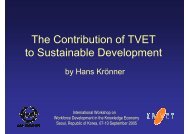Learning for Life, Work and the Future Initial ... - Unesco-Unevoc
Learning for Life, Work and the Future Initial ... - Unesco-Unevoc
Learning for Life, Work and the Future Initial ... - Unesco-Unevoc
Create successful ePaper yourself
Turn your PDF publications into a flip-book with our unique Google optimized e-Paper software.
Page 84 Participants’ Papers <strong>Learning</strong> <strong>for</strong> <strong>Life</strong>, <strong>Work</strong> <strong>and</strong> <strong>the</strong> <strong>Future</strong><br />
employment, but also technical <strong>and</strong> entrepreneurial<br />
skills <strong>for</strong> enterprise development. This programme<br />
needs to prepare graduates <strong>for</strong> <strong>the</strong> scourge of unemployment,<br />
which is a growing threat.<br />
26 TSVERE, Maria (Zimbabwe):<br />
The Implications of HIV/AIDS Education on TVET<br />
1. Introduction<br />
UNAIDS estimates that 95% of all HIV/AIDS infected<br />
people now live in <strong>the</strong> developing world, which has<br />
also experienced about 95% of AIDS-related deaths<br />
(UNAIDS 1999:3). In Zimbabwe it is estimated that<br />
one in every four sexually active people is infected<br />
with AIDS. Statistics also show that <strong>the</strong> 25 to 39-yearolds,<br />
<strong>the</strong> most productive <strong>and</strong> sexually active age group<br />
to which belong students <strong>and</strong> teachers at technical <strong>and</strong><br />
vocational institutions, is <strong>the</strong> most infected. In sub-<br />
Saharan Africa about 92% of infections are transmitted<br />
by <strong>the</strong> horizontal mode of transmission (through<br />
heterosexual contact). Research evidence from an<br />
AIDS baseline survey conducted in Zimbabwe <strong>for</strong><br />
secondary schools revealed that 40% of girls have sex<br />
be<strong>for</strong>e <strong>the</strong>y reach Form Three (MoE/UNICEF, 1996:<br />
v). The TVET system draws its students from <strong>the</strong><br />
secondary schools.<br />
2. Factors Contributing to <strong>the</strong> Spread of HIV/AIDS<br />
Greater underst<strong>and</strong>ing of factors leading to <strong>the</strong> spread<br />
of HIV/AIDS is crucial in determining intervention<br />
strategies to curb <strong>the</strong> spread of <strong>the</strong> virus. Apart from<br />
<strong>the</strong> bio-medical factors, sexual behaviour, social <strong>and</strong><br />
economic factors seem to affect most of <strong>the</strong> students<br />
<strong>and</strong> teachers in <strong>the</strong> TVET system. Unprotected sex,<br />
lack of communication on knowledge of partners’<br />
HIV/AIDS status, sexual practices, <strong>the</strong> extent of<br />
alcohol consumption <strong>and</strong> concurrent partners are<br />
common factors in <strong>the</strong> TVET system. The low level of<br />
education, lack of knowledge <strong>and</strong> in<strong>for</strong>mation about<br />
HIV/AIDS <strong>and</strong> safe sex, all contribute to <strong>the</strong> poor<br />
condom use by most students <strong>and</strong> teachers in <strong>the</strong><br />
system. Gender roles, female employment <strong>and</strong> acceptance<br />
in <strong>the</strong> TVET system’s SMT section, status<br />
<strong>and</strong> income inequality all affect <strong>the</strong> manner in which<br />
HIV/AIDS is perceived in tertiary institutions where<br />
TVET is located. TVET systems require that <strong>the</strong>ir<br />
students have some industrial experience be<strong>for</strong>e <strong>the</strong>y<br />
graduate. This obliges <strong>the</strong>m to be attached to industry<br />
during <strong>the</strong>ir course, a situation that exposes <strong>the</strong>m to<br />
additional risks associated with HIV/AIDS transmission.<br />
Being quintessentially a social epidemic, AIDS<br />
impacts on social norms, development <strong>and</strong> government<br />
ef<strong>for</strong>ts. Developing countries are characterized by lack<br />
of employment, which is about 50% in Zimbabwe <strong>and</strong><br />
perhaps in most o<strong>the</strong>rs. Income distribution has a<br />
strong influence on <strong>the</strong> degree of control students in<br />
TVET systems have over <strong>the</strong>ir sex lives. Most people,<br />
including those in <strong>the</strong> TVET system, are also looking<br />
<strong>for</strong> ways of improving <strong>the</strong>ir lives in terms of health,<br />
education <strong>and</strong> recreation. Meanwhile <strong>the</strong> rich, powerful,<br />
mobile <strong>and</strong> less-constrained few can af<strong>for</strong>d <strong>the</strong><br />
lifestyles of <strong>the</strong>ir choice. TVET students fall prey to<br />
some of <strong>the</strong>m in an ef<strong>for</strong>t to raise <strong>the</strong>ir nutritional<br />
levels. Those students who are really poor, orphaned,<br />
or are parents, suffer from being unable to care <strong>for</strong><br />
<strong>the</strong>ir families because of <strong>the</strong> high cost of living.<br />
Fur<strong>the</strong>rmore, <strong>the</strong> paternalistic Zimbabwean culture<br />
<strong>for</strong>ces some female students to look <strong>for</strong> men to marry<br />
<strong>the</strong>m. They are obliged to have children even be<strong>for</strong>e<br />
<strong>the</strong>y have completed <strong>the</strong>ir course.<br />
All <strong>the</strong>se factors make students <strong>and</strong> teachers in TVET<br />
systems work hard <strong>and</strong> strive <strong>for</strong> better lives so that<br />
<strong>the</strong>y can take control of <strong>the</strong>ir sexual activity <strong>and</strong> be<br />
saved from <strong>the</strong> effects of HIV/AIDS infection <strong>and</strong><br />
AIDS.<br />
A person with <strong>the</strong> virus is affected emotionally as well<br />
as physically. Teachers <strong>and</strong> students in <strong>the</strong> TVET<br />
system also face <strong>the</strong> challenge of having to deal with<br />
<strong>the</strong>ir HIV/AIDS status. This situation is most<br />
prominent amongst teachers, who become ineffective<br />
<strong>and</strong> withdrawn or even disappear when <strong>the</strong>y become<br />
too noticeably ill.<br />
3. The Effect of HIV/AIDS on TVET<br />
The World Bank (1992:69) projected that by 2010<br />
Tanzania will have lost 14,460 teachers to AIDS.<br />
Statistically, this figure accounts <strong>for</strong> two-thirds of <strong>the</strong><br />
annual output of <strong>the</strong> teacher training colleges in <strong>the</strong><br />
country. TVET systems demonstrate a similar trend<br />
today. In Zimbabwe <strong>the</strong>re seems to be no decline in<br />
<strong>the</strong> number of HIV/AIDS infections, <strong>and</strong> institutions<br />
are experiencing a steady increase in <strong>the</strong> number of ill<br />
teachers <strong>and</strong> AIDS-related deaths throughout <strong>the</strong><br />
education system. An analysis of female student<br />
records in Zimbabwean colleges (ED46) has shown<br />
that an average of 20% of female students dropped out<br />
of college due to pregnancy, indicating <strong>the</strong> degree of<br />
unprotected sex in <strong>the</strong>se institutions. The major<br />
problem with <strong>the</strong> teaching profession is that it is<br />
difficult to simply terminate an ill teacher’s services,<br />
yet teaching is one of <strong>the</strong> most highly paid professions.<br />
High salary costs mean that <strong>the</strong> Ministries of Education<br />
have to bear <strong>the</strong> burden of supporting unproductive<br />
lecturers <strong>and</strong> teachers, <strong>and</strong> compromise <strong>the</strong> quality of<br />
education by hiring part-time or temporary substitutes.





